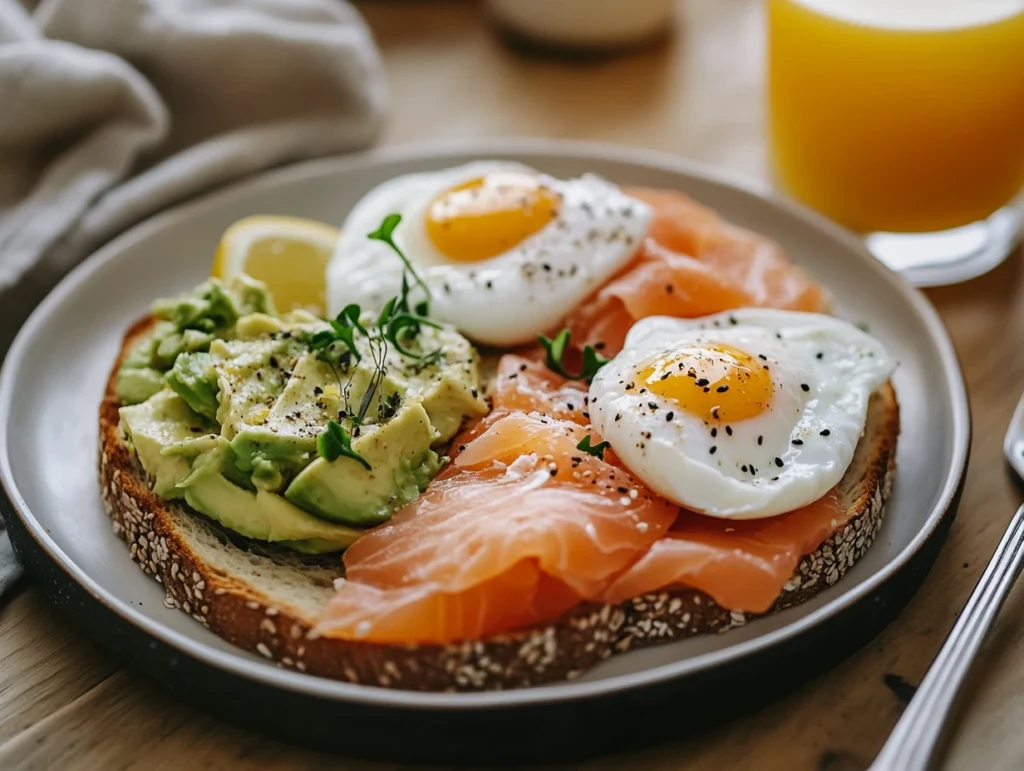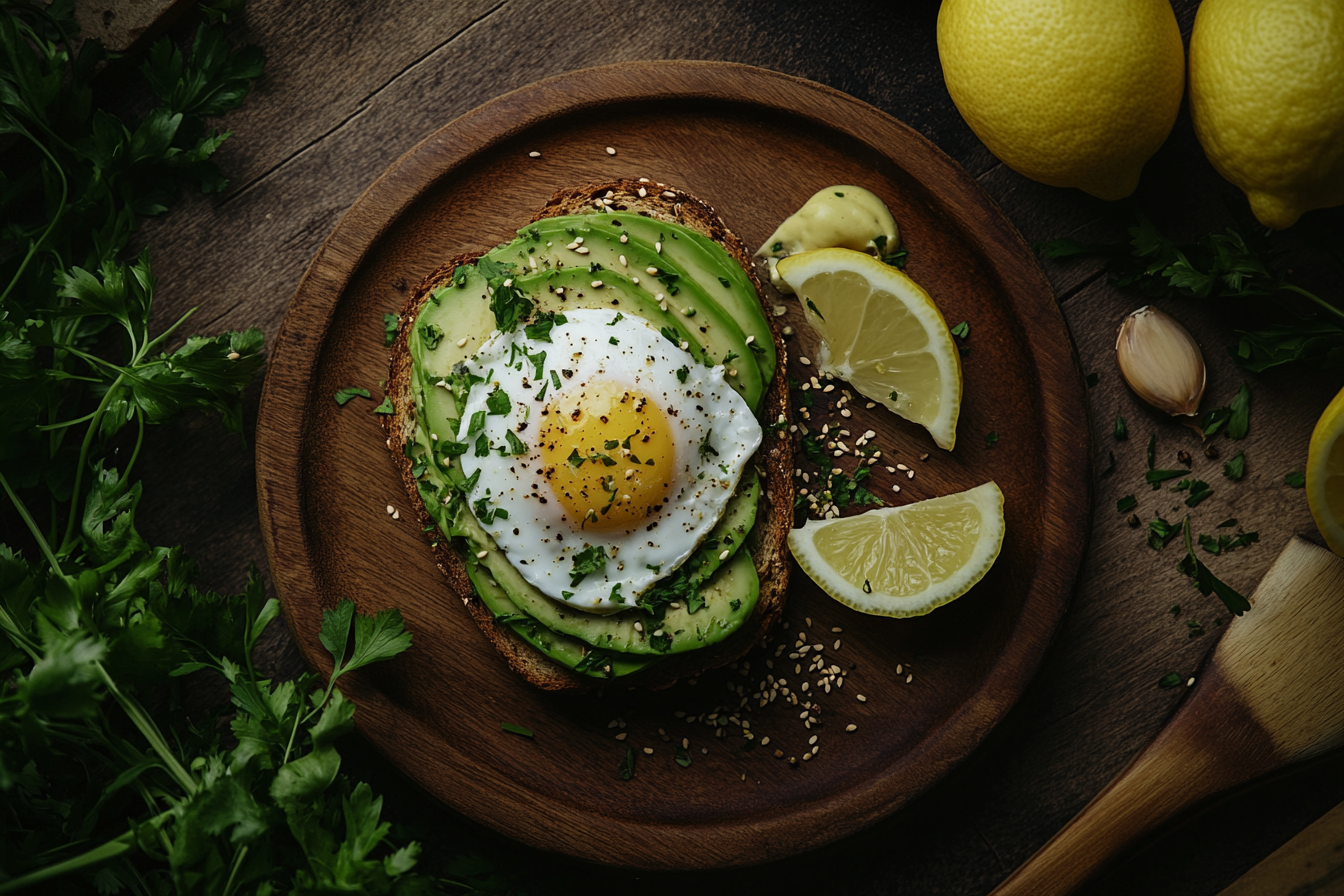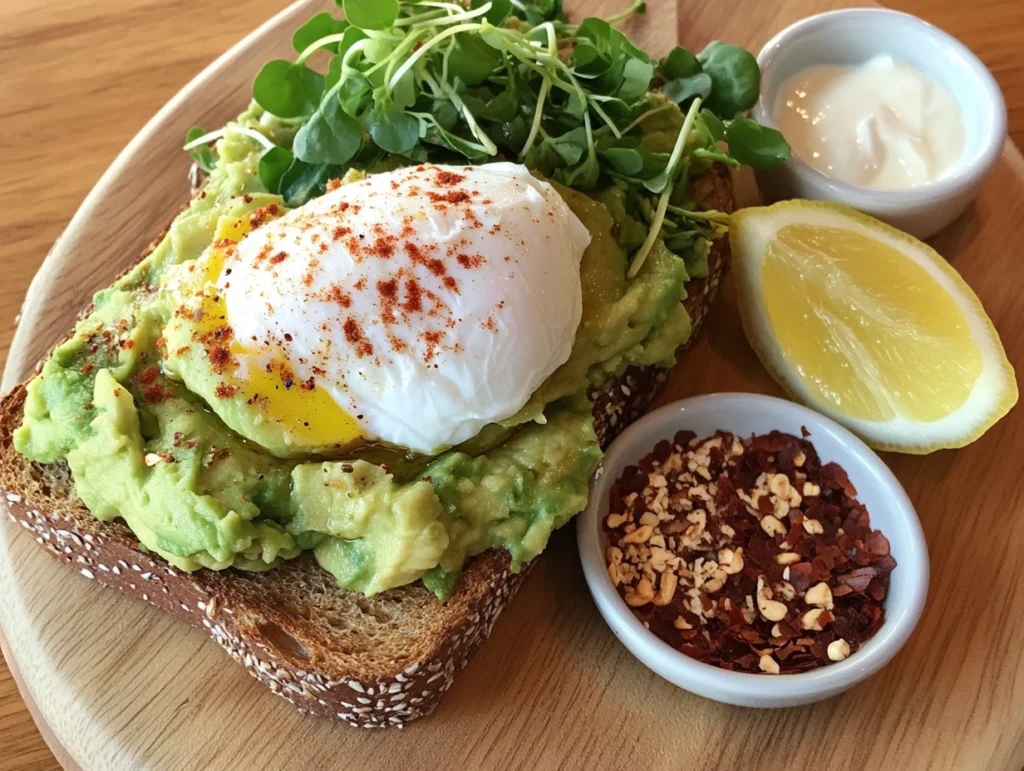Avocado toast has become a breakfast staple for many. It’s loved not just for its vibrant color but also for its perceived health benefits. This trendy dish is a favorite among health-conscious individuals, foodies, and busy professionals. Whether you’re grabbing a quick bite before work or enjoying a weekend brunch, many wonder how avocado toast calories fit into a healthy diet.
But is this meal as healthy as it seems? More importantly, how do the calories in avocado toast stack up? Can it really support weight loss goals? Let’s dive into the nutritional breakdown and see if avocado toast is truly the ultimate healthy breakfast option.
The Nutritional Breakdown of Avocado Toast
To assess whether avocado toast is as healthy as it seems, we need to start with its basic ingredients: avocado and bread. A standard serving of avocado toast typically includes one slice of bread topped with about 1/3 to 1/2 of a medium avocado.
- Calories in Avocado: A serving size of about 1/3 of a medium avocado contains roughly 80-107 calories. Avocados are rich in healthy fats, providing around 10 grams of fat per serving, most of which come from heart-healthy monounsaturated fats. Additionally, a serving provides about 4.5-8 grams of fiber and 5.5 grams of carbohydrates, making it a nutrient-dense option.
- Calories in Bread: The type of bread you choose can significantly impact the overall calorie count. Whole grain bread generally contains 70-110 calories per slice and offers a fiber boost. In contrast, refined white bread can have similar calorie counts but lacks the fiber that aids digestion and promotes satiety.
A basic avocado toast using whole grain bread typically clocks in at around 195-260 calories. For comparison, more elaborate versions like an avocado toast with a fried egg can contain 260-331 calories, depending on the size of the egg and amount of avocado used.
How Toppings Affect Calories
While the basic version of avocado toast is relatively low in calories, different toppings can drastically alter the nutritional profile:
- Avocado toast with egg: Adding a poached or fried egg can increase the calorie count by 70-90 calories, but it also boosts the protein content, making your meal more filling and balanced.
- Smoked salmon: This topping can add healthy omega-3 fats but will bump up the calorie count by about 66 calories per ounce.
- Cheese: Adding cheese, like feta or goat cheese, increases both flavor and calories (about 70-100 calories per ounce).
Restaurants like Dunkin’ offer avocado toast variations, and their version averages around 240-260 calories, similar to homemade versions, depending on the bread used and any added spreads.
Avocado’s Nutritional Value and Health Benefits
Avocados are often labeled a superfood due to their rich nutritional content. Let’s break down the key benefits:
- Monounsaturated Fats: Avocados are packed with monounsaturated fats, which are the healthy fats that help support heart health. According to Harvard Health, these fats can help reduce bad cholesterol levels, lower the risk of heart disease, and reduce inflammation.
- Dietary Fiber: With around 4.5-8 grams of fiber per serving, avocado toast can significantly contribute to your daily fiber intake. The Mayo Clinic highlights the importance of dietary fiber for digestive health, promoting satiety, and even aiding in weight management. Fiber-rich meals like avocado toast can help control appetite, making it easier to manage caloric intake throughout the day.
- Vitamins and Minerals: Avocados are rich in essential nutrients, including vitamin E, potassium, folate, and B-vitamins, all of which support overall health. For instance, potassium plays a key role in maintaining blood pressure levels, and folate is vital for cell growth and function.
These attributes make avocado toast a well-rounded and nutritious option for those looking for a balanced breakfast.
Calories in Avocado Toast: How Does It Compare?
While avocado toast is a nutritious option, it’s important to compare its calorie content with other popular breakfast choices:
| Breakfast Item | Calories | Nutritional Value |
|---|---|---|
| Avocado Toast (Basic) | 195-260 | Healthy fats, fiber, vitamins |
| Avocado Toast with Egg | 260-331 | Added protein and fats |
| Buttered Toast (1 slice) | 200-250 | High in saturated fat, less fiber |
| Peanut Butter Toast (1 slice) | 280-350 | High in protein but more calories |
| Bagel with Cream Cheese | 350-400 | High in refined carbs, less fiber |
When comparing, avocado toast generally offers fewer calories than options like a bagel with cream cheese and is more nutrient-dense than buttered toast. Whole grain bread adds fiber, while avocado provides healthy fats, which help with digestion and fullness.
Avocado Toast for Weight Loss: Can It Help?
One of the reasons avocado toast has gained popularity is its potential role in supporting weight loss. But how exactly does it help?
- Satiety and Fullness: Avocados are rich in both healthy fats and fiber, two nutrients that play a significant role in promoting fullness. Fiber helps slow down digestion, while monounsaturated fats increase satiety, reducing the likelihood of overeating throughout the day.
- Calorie Control: Despite being relatively low in calories, avocado toast is filling, making it easier to maintain a caloric deficit, which is essential for weight loss. Studies have shown that including healthy fats and fiber in your meals can help control hunger and reduce snacking.
- Protein Boost: Adding protein-rich toppings such as eggs, grilled chicken, or beans can further enhance avocado toast’s weight-loss benefits. Research on the importance of fiber in your diet also highlights how fiber, alongside protein, promotes satiety, helping to control hunger and reduce overall calorie intake during weight loss. Incorporating both fiber and protein makes avocado toast a more filling and balanced meal.
When paired with portion control and nutrient-dense toppings, avocado toast can be a satisfying and effective option for those aiming to lose weight.
Choosing the Right Bread: The Whole Grain Advantage
The type of bread you choose for your avocado toast can significantly affect its nutritional value. Whole grain bread is generally recommended over refined white bread for several reasons:
- Fiber Content: Whole grain bread is richer in fiber, which aids digestion and promotes feelings of fullness. This fiber can also help prevent spikes in blood sugar, making it a better option for those managing their weight or blood sugar levels.
- Nutrient Density: Whole grains retain more nutrients, such as B vitamins, iron, and magnesium, compared to their refined counterparts. These nutrients support energy levels and overall health.
For those on a low-carb or keto diet, alternatives like almond flour or keto bread can help reduce carbohydrate intake while still offering a satisfying breakfast. For more options, explore our article on “Exploring whole grain and keto bread recipes”.
Adding Protein to Avocado Toast for a Balanced Breakfas

While avocado toast is nutritious on its own, adding protein can create a more balanced and filling meal. Protein helps with muscle maintenance, supports metabolic functions, and keeps you fuller for longer. Here are some protein-rich toppings to consider:
- Eggs: A poached or fried egg adds roughly 6-7 grams of protein and about 70-90 calories. Avocado toast with poached egg is a popular option because the egg enhances both the flavor and the nutritional profile.
- Smoked Salmon: Rich in omega-3 fatty acids and protein, smoked salmon can add approximately 5 grams of protein per ounce, making it a great choice for those looking to increase their intake of heart-healthy fats.
- Grilled Chicken: For a lunch twist, adding grilled chicken provides lean protein and makes for a heartier meal. This option adds about 20-25 grams of protein per serving.
Adding a source of protein not only boosts your intake but also helps create a meal that’s more likely to keep you satisfied until your next meal. Check out Healthy lunch options like grilled chicken wraps for more ideas on combining flavors.
Healthy Fats in Avocado: The Good Kind of Fat
One of the major reasons avocado toast is considered a healthy choice is due to the type of fats found in avocados. Avocados are rich in monounsaturated fats, which are considered heart-healthy and essential for overall well-being.
- Comparison with Butter: Many people wonder how avocado toast fat vs. butter stacks up. While both are sources of fat, butter is high in saturated fats, which can raise cholesterol levels. Avocado, on the other hand, provides plant-based fats that can lower bad cholesterol and improve heart health. In fact, replacing butter with avocado on toast can cut down calories as well, with avocado containing about 45 calories per ounce, compared to 203 calories in an ounce of butter.
Incorporating healthy fats into your diet is beneficial for maintaining cardiovascular health, and avocado toast is a great way to do so without the risks associated with saturated fats.
Avocado Toast Variations for Different Dietary Goals
One of the beauties of avocado toast is its versatility. Whether you’re looking to cut calories, increase protein, or follow a plant-based diet, there are plenty of ways to modify this dish to suit your dietary needs.
- Low-Calorie Options: To make a low-calorie avocado toast, reduce the portion of avocado to 1/4 or use a thinner slice of bread. Opt for toppings like tomato slices, cucumber, or sprouts to keep the calorie count low.
- Keto-Friendly Version: Swap out traditional bread for keto bread made from almond flour or coconut flour to lower the carb count.
- Vegetarian or Vegan Options: Skip animal-based toppings and go for nutrient-dense choices like hummus, roasted chickpeas, or nutritional yeast for added flavor and texture.
By swapping out ingredients or adjusting portions, you can enjoy avocado toast while aligning it with your personal health goals.
Portion Control and Calories: How to Keep Your Toast in Check
Although avocado toast is healthy, portion control is key to keeping calories in check, especially if you’re monitoring your intake for weight loss. Here are a few tips:
- Use a smaller portion of avocado: Instead of using half an avocado, stick to 1/3 or even 1/4 to control calories while still benefiting from the healthy fats.
- Choose thinner slices of bread: Opt for a single thin slice of whole grain or sourdough bread to reduce carbohydrate intake without sacrificing flavor or texture.
- Avoid high-calorie toppings: Skip the bacon, extra cheese, or heavy drizzles of olive oil, which can add unnecessary calories.
Being mindful of your portions allows you to enjoy the benefits of avocado toast without tipping the scales on your daily caloric intake.
The Role of Fiber in Avocado Toast
Fiber plays a critical role in overall health, especially when it comes to digestion and managing appetite. Avocados are naturally high in dietary fiber, offering around 4.5-8 grams per serving. Combined with the fiber from whole grain bread, avocado toast can be an excellent source of this vital nutrient.
According to the Mayo Clinic, fiber not only aids digestion but also helps with weight management by promoting feelings of fullness, which can help reduce overall calorie intake.
Macronutrient Balance: Building a Well-Rounded Breakfast
Avocado toast hits all the right marks when it comes to balancing the macronutrients your body needs. It provides:
- Healthy fats from avocado.
- Carbohydrates from whole grain bread.
- Protein from toppings like eggs or beans.
A well-balanced meal should include a combination of carbs, fats, and protein to support energy levels, muscle maintenance, and overall health. Adding nutrient-rich foods like fruits, nuts, or seeds can further enhance the macronutrient profile of your avocado toast.
Potential Downsides of Avocado Toast
While avocado toast has many benefits, there are a few potential downsides to be mindful of:
- High-Calorie Toppings: Adding excessive amounts of cheese, bacon, or butter can turn an otherwise healthy meal into a calorie-laden dish.
- Lack of Protein: A basic avocado toast may not provide enough protein for those looking to build muscle or stay fuller for longer. Adding a protein source can remedy this.
- Environmental Impact: Avocados require significant resources to grow, and their popularity has raised concerns about sustainability. If this is a concern, consider balancing your avocado consumption with other plant-based fats, like nuts or seeds.
How to Make a Healthier Avocado Toast
If you’re looking to elevate your avocado toast while keeping it healthy, here are some simple tips:
- Use whole grain or sourdough bread for added fiber and nutrients.
- Add leafy greens like spinach or arugula for a nutrient boost.
- Top with low-calorie veggies such as tomatoes, cucumber, or radishes to add texture and flavor without increasing calories.
- Incorporate healthy fats like a drizzle of olive oil or a sprinkle of seeds.
For more creative ideas, check out our article on Creative breakfast ideas with sourdough bread.
Conclusion: Is Avocado Toast as Healthy as It Seems?
In conclusion, avocado toast is a healthy and nutrient-dense breakfast option when made with the right ingredients and portion sizes. It provides a good balance of healthy fats, fiber, and essential vitamins, making it a great choice for a satisfying and wholesome meal. However, it’s important to be mindful of your toppings and portions to ensure you’re keeping calories in check. Whether you’re aiming for weight loss or just a nutritious start to your day, avocado toast can easily fit into your healthy eating plan.
FAQs
1. How many calories are in a basic avocado toast?
A basic avocado toast contains about 250-300 calories, depending on the portion of avocado and the type of bread used.
2. Can avocado toast help with weight loss?
Yes, avocado toast can help with weight loss when portion-controlled and paired with nutrient-dense toppings. The combination of healthy fats and fiber can promote satiety and reduce overall calorie intake.
3. What bread is best for avocado toast?
Whole grain or sourdough bread is best for avocado toast due to its high fiber content and slower digestion, which can help maintain fullness.
4. Is adding protein to avocado toast necessary?
Adding protein like eggs or lean meats is beneficial for creating a more balanced and satisfying meal, supporting muscle health and boosting metabolism.
5. Can I make avocado toast low in calories?
Yes, you can make a low-calorie avocado toast by using smaller portions of avocado, opting for thinner slices of bread, and adding low-calorie toppings like sprouts or tomatoes.

